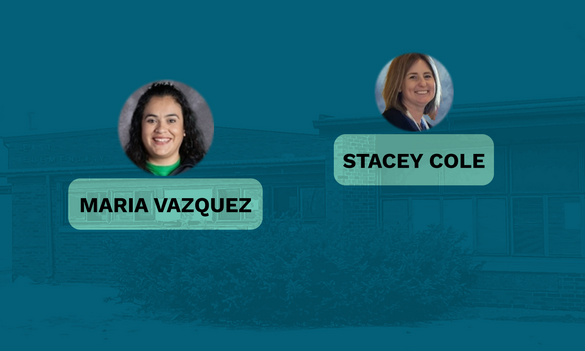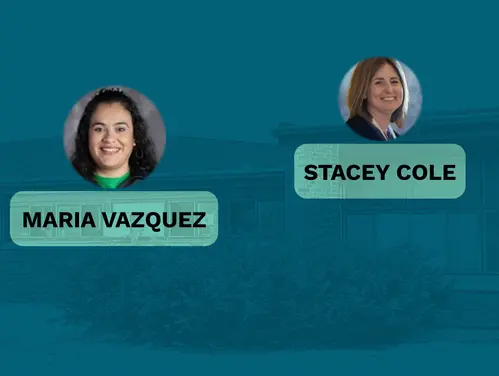Maria Vazquez vividly remembers starting fifth grade in the Storm Lake Community School District in 1992. Fresh from Mexico, she didn’t speak a word of English.
“I remember walking into the middle school and the principal took me by the hand and walked me to my classroom,” she said. “He was talking to me but I couldn’t understand. I started crying.”
Though the teacher worked hard at making Vazquez feel comfortable, the girl felt scared, isolated. Then lunch time was the breaking point. She didn’t see any familiar food.
“I remember getting under the table and crying,” she said.
Thankfully, the school’s secretary spotted what was going on and took the girl to her office.
“I couldn’t understand her but she bought me a Coke and potato chips,” Vazquez said. “I just remember feeling safe with her and I realized I would be OK. I thought, ‘I want to be that person, I want to be the person who lets others know they are going to be OK.’”
As fate would have it, that’s precisely what came to pass. Today, Vazquez works with families in the Storm Lake district who are making the difficult transition to American life. But the district has amped up the concept, and now has four facilitators who work with underrepresented student populations and their families – which makes up 87 percent of the student population – from migrants to English language learners to potential drop-outs.
Just over three years ago, Vazquez was the only person working with the families. And that’s when Superintendent Stacey Cole realized the unmet needs in her district.
“We had one migrant coordinator who was housed at one of the buildings,” Cole said. “Maria would bring in parents monthly where she would talk about services available to the families. As far as working with kids, not much was happening.”

Cole and her team started brainstorming.
“We started identifying barriers the families were facing,” she said. “For instance, if you are on Medicaid and need glasses, you are sometimes driving up to an hour to get your service. Initially, we would handle these things as we would learn about them, like ‘hey, can anyone take this student to her physical?’ It was very disjointed. But we finally realized that there are many families in the same boat.”
While funding streams ensured that migrant students were taken care of, other students in need were falling through the cracks.
“We thought, ‘wouldn’t it be cool if we had a migrant coordinator in each building?’” Cole said. “We could provide food, transportation, clothing and meet the needs of all students. So we started consulting with our Area Education Agency and the Department of Education, looking at our funding, Title III, a portion of ELL (English language learners) and a portion of our dropout prevention. We were looking at ways to braid the funding to meet everyone’s needs.”
The district started using the Professional Learning Communities concept within this team – known as PLCs, in which educators put their heads together to tackle school-wide issues – to focus on meeting the needs of all students. And they worked to change the educators’ mindset.
“One student had tutoring needs and he had a funding resource, but then I was like, ‘gosh, we should look through our list of kids and make sure no one else goes without tutoring if they need it,’” Cole said. “And we started looking at all the things we were providing individual students and asking ourselves, ‘does someone else need this?’ For instance, one child needed a hotspot and we asked ourselves, ‘do other students need hotspots?’”
“The work that Storm Lake is doing is a huge deal,” said Jillian Dotson, the federal programs bureau chief at the Iowa Department of Education. “The fact they are using their PLC meetings to focus on at-risk populations is very impressive. And they are doing that by paying salaries out of federal title funds – it is a perfect way to go about it.”
It was three years ago that the district launched the program that put the four facilitators to work.
“They are facilitators of students and family services,” Cole said. “They each have their own assigned duties, such as Maria doing the coordination of migrant kids, while another does paperwork for the homeless. They each have their special niches, but they are doing similar work in their buildings.”
The facilitators handle a wide range of needs, from food insecurity to families going through crises.
The holistic approach includes wading through culture differences.
“We have a lot of hidden rules in this country, and Maria and the team really help families navigate the invisible things that families don’t know are there,” Cole said. “Something as simple as the cords on graduation caps – what do they mean? Also, the facilitators occasionally have to teach families that certain disciplinary practices at home don’t meet the norms of our country.
“They also are sounding boards to the families. They serve as the liaison between the family and the school. They work to remove barriers the families face.”
The success is multi-pronged: Students do better academically, families adapt to their new lives quicker and the schools face improved attendance and fewer drop-outs.
“We work with the parents on attendance,” Cole said. “Our trends with attendance are positive.”
For Vazquez, it’s more than a dream-come-true job.
“It is super rewarding,” she said. “I wish they had something like this when I came to the U.S. I have been working with one kid from Mexico and another from Cuba. They were initially terrified – I remember that feeling well. They were overwhelmed with going through the cafeteria and seeing food they were totally unfamiliar with, like applesauce.”
“I love putting the kids at ease. I love seeing them succeed. Often, when we have graduation, they will come up to me and say, ‘how can I ever repay you?’ I say, ‘pay it forward, help others.’”
